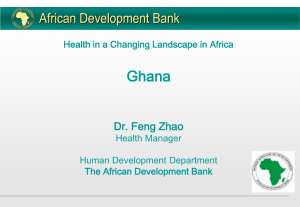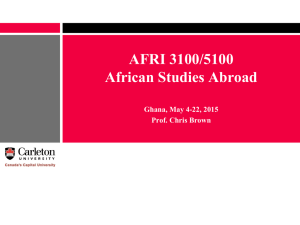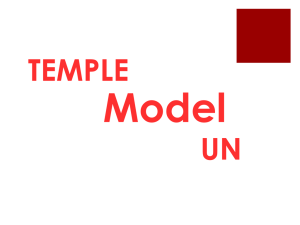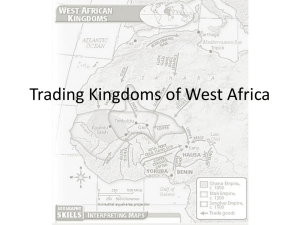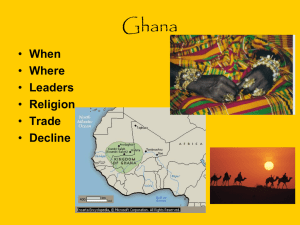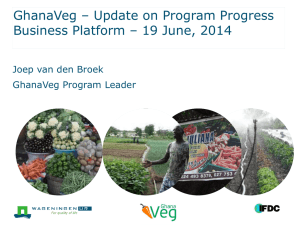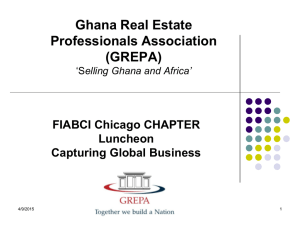The Ghana Eurobond Transaction
advertisement
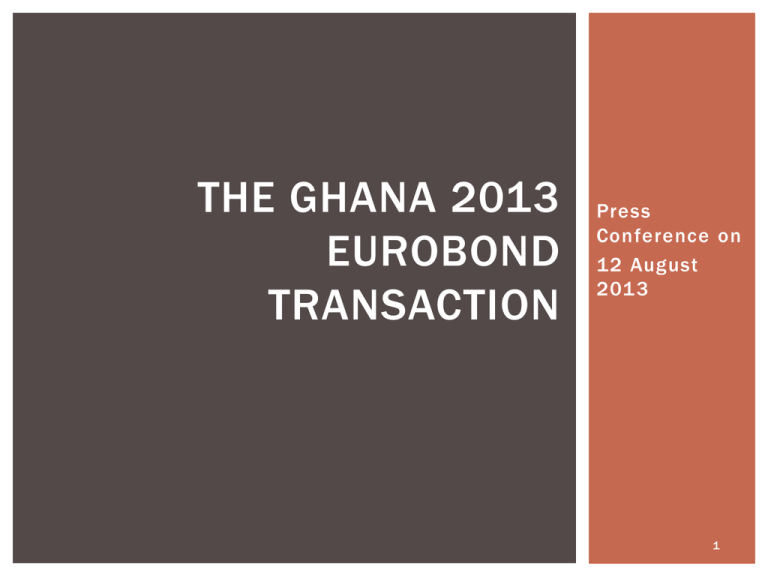
THE GHANA 2013 EUROBOND TRANSACTION Press Conference on 12 August 2013 1 GOALS Diversify Sources of Funding Consolidation of middle income status Decreasing flow of concessional financing Reduce the debt service cost and rollover risk of the Ghana 2017 bond Reduce the cost of government financing Current cost of domestic financing 19-21% Improve tenor/length of financing the capital budget Compare tenor of 3 or 5-year (or proposed 5-year) domestic bonds to the 10-year tenor for Sovereign Bond 2 PLANNED USE OF PROCEEDS AMOUNTS INDICATIVE AREAS USD (MILL) % GHS % Counterpart funding for approved projects 102 10% 204 10% New Projects in 2013 Budget 307 31% 614 31% Early Redemption of Ghana 2017 Eurobond 250 25% 500 25% Refinancing of maturing Domestic debt 341 34% 682 34% Total 1,000 100% 2,000 100% 3 THE PROCESS Budget Proposal (March 2013) Cabinet approval (April 2, 2013) Parliamentary Approval (26 June 2013) Recruitment of transaction advisors (June 2013) Preparation of transaction documents (June -July 2013 Marketing of Bond (road show) (22 -25 July, 2013) Launch of Transaction (25 July 2013) Pricing (26 July 2013) Launch of bond exchange of fer (26 July 2013) Issue & Closing (7 August 2013) 4 TRANSACTION TEAM Lead Managers (Citigroup, Barclays) Co-Managers (EDC Stockbrokers, Strategic African Securities) International legal counsel (Denton’s) Local legal counsel (JLD & MB) Government of Ghana Transaction Committee (MoF, Bank of Ghana) 5 ROAD SHOW Ghana’s investor roadshow was designed to be broad-reaching The Republic’s had been absent from the international bond markets for the last six years There was a non-deal road-show in April 2013 (part of IMF/WB Spring meetings) and some periodic meetings with some investors Two teams travelled to London, Frankfurt, Munich, Sam Francisco, Los Angeles, Boston and New York Ghana met with 58 investors via one -on-one meetings, group events or conference calls The Ghana team was represented by Minister of Finance Deputy Minister of Finance Governor of Bank of Ghana Deputy Governor of Bank of Ghana Additional officials from both the Ministry of Finance Bank of Ghana 6 THE GHANA CREDIT STORY Despite current fiscal challenges, investors saw fundamental long-term value in Ghana reflected in: Governance Political stability with strong institutions Good governance - Ghana consistently ranks in the Top 10 for African Governance (Mo Ibrahim Index) Good Business Environment Strong Reform agenda – Public Financial Management, Financial Sector, Infrastructure The Economy One of the fastest growing economies in Africa A diversified economy Oil & Gas Prospects with sound revenue management under the Petroleum Revenue Management Act 7 TERMS OF THE TRANSACTION ISSUER Republic of Ghana ISSUE RATINGS B1 Stable (Moody’s) B+ Negative (Fitch) B Stable (Standard & Poor) Size US$ 1 billion Coupon 7.875% Price 99.1515 Issue Date 7 August 2013 Maturity Date 7 August 2023 Proceeds $741,432,500 (after discount and estimated issue expenses) Listing Irish Stock Exchange Ghana Stock Exchange (To be listed in August 2013) 8 ANALYSIS OF RECENT AFRICAN SOVEREIGN ISSUES ISSUER RATING Ghana B1/B+/B Nigeria BB-/BB- SIZE ISSUE ($MM) DATE 1,000 Aug 2012 MATURITY Coupon YIELD AT (YRS) (%) ISSUE (%) 10 7.875 8.000 500 July 2013 5 5.125 5.375 BB-/BB- 500 July 2013 5 6.375 6.625 Rwanda B/B 400 May 2013 10 6.625 6.875 Zambia B+/B+ 750 Sep 2012 5.375 5.625 10 Note differences among countries Ratings Timing or dates Size of offers Blend of offers (Nigeria) Tenor of offers Market conditions Processes 9 COMPARISON OF COSTS Nigeria Higher credit rating Shorter maturity (5-Year) Rwanda Good market timing (May 2013) Before Bernanke’s announcement (Wednesday June 19) of likely tapering of quantitative easing resulting in interest rate hikes and high market volatility Zambia Good market timing (September 2012) 10 SECONDARY MARKET QUOTES AUGUST 7, 2013 ISSUER Coupon (%) MATURITY YIELD Ghana 8.500 2017 5.65 Ghana 7.875 2023 8.06 Nigeria 5.125 2018 4.52 6.375 2023 5.97 Rwanda 6.625 2023 8.13 Zambia 5.375 2022 7.03 Secondary market trading indicates that Ghana’s bond is well priced Rwanda (B) is trading at a higher yield than Ghana (B/B+) (8.13% versus 8.06%) Therefore Rwanda is NOT more creditworthy than Ghana Zambia is trading at a higher yield compared to Ghana 2017 (because of maturity dif ference – Ghana 2017 has shorter maturity) 11 INVESTORS WHO BOUGHT OUR BONDS Summary of Order Book Orders ($m) $2,157 # of Orders 174 Allocations ($m) $750 Allocations (# of investors) 158 Allocations to Local Institutional Investors ($m) $16.5 Allocations by Investor Location Asia Other 2% 2% Europe 15% U.K. 21% U.S.A. 60% 12 MANAGING OUR DEBT MORE EFFICIENTLY Ghana became the first Sub -Saharan African country (excluding South Africa) to use the Eurobond market to manage its overall debt by: Reducing cost Reducing the risk of rollover Ghana 2017 is a bullet bond repayable in October 2017 Risk of high interest rate or uncertain market access Prudent to initiate an orderly retirement to reduce market risks of rollover 13 REDUCING THE COST AND ROLLOVER RISK OF THE GHANA 2017 BOND On 26 July 2013, one day after pricing of the new US$750m 7.875% notes due 2023 (the “New Notes”), Ghana launched an invitation to holders of Existing Ghana 2017 Notes to exchange their holdings for up to US$250m of new 7.875% notes due 2023 US$356m of Existing Notes were validly tendered This translated into and Exchange of $219 million face value of the Ghana 2017 The dif ference in interest costs between the Ghana 2017 bond (8.50%) and the new Ghana 2023 Bond (7.875%) translates into an estimated annual savings of $ 1 .375MM 14 REDUCING THE COST OF DOMESTIC DEBT The proposed refinancing of maturing domestic debt with Eurobond proceeds is justified in the dif ference in cost between domestic debt (19 – 23%) and the Eurobond (7.875%). Estimated annual interest savings after adjusting for exchange rate depreciation is GH¢21 – 48 million 15 CONCLUSION Ghana achieved its financing objectives with the transaction Extended Ghana’s maturity profile Reduced the rollover risk of the Ghana 2017 bond Raised cost effective funds to refinance high-cost domestic term debt Set a new benchmark and achieved a lower coupon than Ghana’s debut 10-year USD bond Listing of notes on the Ghana Stock Exchange, facilitating access for local investors. First sub-Saharan African country (excluding South Africa) to listed its Eurobond on the local stock Exchange Ghanaian institutional investors (banks, insurance companies, pension funds) participated in the offer. 16 LOOKING AHEAD Debt policy will be guided by the principle of financing capital expenditures with domestic and international long -term debt (the upcoming debut issue of a domestic seven -year bond reflects this policy) Project specific bonds will be raised for self -financing projects while general conventional bonds will be raised for other capital expenditures Ghana will continue to source concessional financing for social infrastructure. 17
